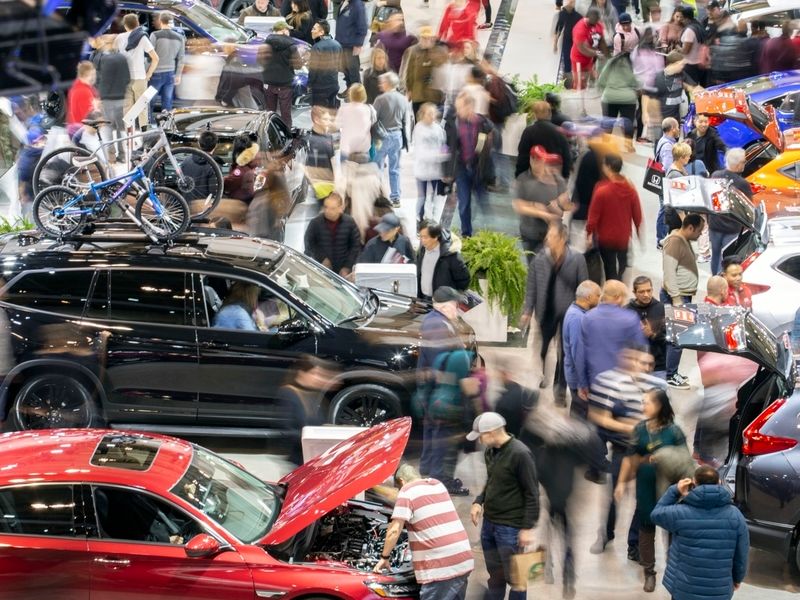
Organizers of the Canadian International AutoShow have until early fall to decide whether the country’s largest consumer trade show will proceed as a live event during the pandemic or move entirely online.
“We will have an event in 2021,” said David McClean, CIAS director of marketing. “The technology exists today to build a virtual platform that allows [the public] to experience the manufacturers’ brands in a virtual environment.
“This … could further be connected to a physical experience, either concurrently or later on.”
CIAS was developing digital options before COVID-19 and will be ready to host a virtual event on the scheduled dates of Feb. 12-21, McClean said. The development is taking place while assessing the viability of the show’s traditional format, he said.
An in-person Toronto show will hinge on the ability to balance visitor safety, government-imposed gathering limits and distancing requirements with cost reductions for automakers and show revenue.
“We will not make a decision just based on profitability,” said CIAS General Manager Jason Campbell. “It has to be based on what is right for the public and what is right for the industry from a reputational standpoint.
“We have decided to do a virtual show for sure, while we await to see if a live in-person show is possible or not…we will make a final call on a live show by Oct. 16 at the latest…but the virtual Show will go on regardless.”
Romano is skeptical
But the writing might already be on the wall as Mazda has already decided to bow out, and Hyundai Canada — a vocal supporter of auto shows — has put plans to exhibit on hold.
“When we’re talking five months away, six months away, to be putting thousands of people together in a conference just doesn’t seem feasible,” said Hyundai Canada CEO Don Romano.
“We’re going to plan for it not to happen and have alternative ways to communicate our numerous products that are going to be coming out over the next six to 12 months.”
Mazda decided in May to skip the 2021 auto show season, said spokeswoman Sandra Lemaitre.
“We honestly couldn’t envision how to safely manage these types of large gatherings while still delivering a positive experience for consumers,” Lemaitre said. “Coupled with the fact that our research showed consumer confidence in attending large gatherings before a vaccine is available is low, it just didn’t make sense for us to participate.”
David Adams, CEO of the Global Automakers of Canada, said that of the association’s member brands that attended auto shows in 2020, only Mazda Canada formally announced its intention to sit out the 2021 circuit. The rest would like to proceed, Adams said, provided that organizers can put forward satisfactory plans to keep the public safe.
Canceling or postponing the country’s largest auto show would likely thrust a stick into the spokes of the entire 2021 schedule. Peter Ginsberg, the producer of the Ottawa-Gatineau International Auto Show, said that shows in smaller markets are at the mercy of what happens in Toronto and Montreal.
“I’ve reached out to some manufacturers, and they’re just hanging tight for now,” Ginsberg said.“Nobody’s making any commitments at this moment. Toronto and Montreal are going to set the pace for what the manufacturers are going to do, and then the other shows follow up from there.”
Virtual experiences could also replace other in-person aspects of the Toronto show, such as the annual Canadian Automobile Dealers Association Summit and media day product unveilings, Campbell said.
In developing a proposal for a live show, he said, CIAS is considering mandating cost-saving measures for all automakers to standardize booth appearance and reduce competitive spending. This could include temporarily banning costly raised-floor and second-ceiling booth structures and elaborate lighting setups. The move is designed to alleviate cost pressures on automakers, thereby encouraging participation.
Convention centers across Canada, meanwhile, are lobbying governments for direction on developing safety protocols for reopening, Campbell said.
Timed ticketing to control attendance is on the table, as is reducing the show’s footprint to half of the Metro Toronto Convention Centre, should enough exhibitors withdraw that the full space is not required.
Too small to be virtual
For smaller, regional shows in Canada, offering an alternative such as a virtual program is cost-prohibitive with little return on investment, said Jim Gillespie, executive manager of the Calgary International Auto and Truck Show, scheduled for March 10-14.
Gillespie said his show is in an all-or-nothing scenario, and a decision will need to be made by early September on whether to proceed based on guidance from Alberta Health Services and automaker participation.
“If Toronto and Montreal go ahead with their shows … we’re hoping that the manufacturers will come right across the country,” Gillespie said.
The Montreal auto show, scheduled for Jan. 15-24, is currently in a holding pattern, said Executive Director Luis Pereira. Consultation is required with the show’s venue, the Montreal Convention Centre, to prepare proposals for distancing measures. Those talks won’t take place until the center reopens Sept. 1 after its summer break.
“Hopefully by then, the government would have put forth some revised guidelines for consumer shows,” Pereira said.
After rescheduling its 100th anniversary for this fall and then being forced to postpone it again until March 24-28, 2021, the Vancouver International Auto Show is in limbo, said Blair Qualey, CEO of the New Car Dealers Association of British Columbia.
“We continue to monitor the situation and work with stakeholders and health authorities and hope to have more information in the coming months,” Qualey said.
Amid the uncertainty across the country, Romano said Hyundai Canada’s plan is to hope for the best but plan for the worst.
“When we see what’s happening down in the [United States] right now with the [infection] numbers, it reminds us it ain’t over till it’s over, and it’s not over.”